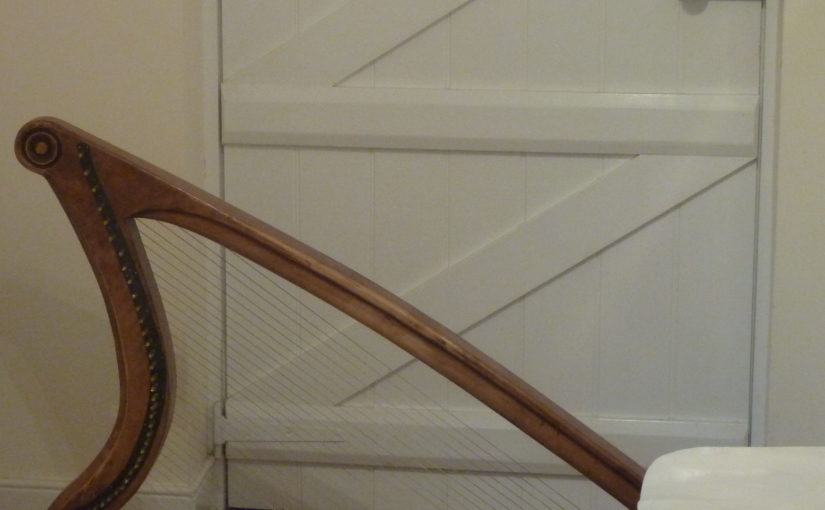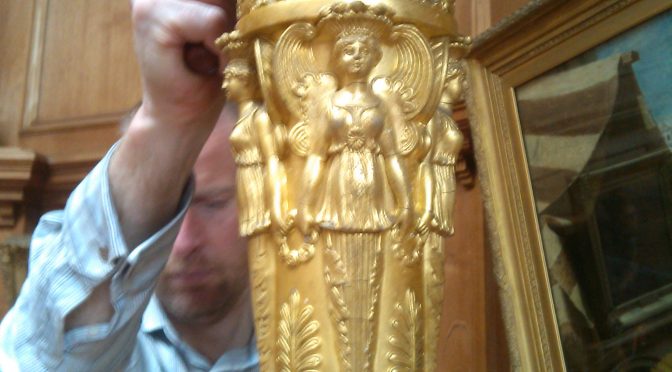Patrick O’Neil was a young traditional Irish harper at the beginning of the 19th century. We have very little information about him, but I am putting him here on his own post so that we can start to think about who he was, and so that we can add more information as and when it turns up.
Continue reading Patrick O’NeilTag: O’Neil
Arthur O’Neil and other harpers named O’Neil
Carolan
We have a few references to a harper called Carolan in the first half of the 19th century. We are never told their first name. I do not know if these all refer to the same person or not. But this post is to gather these references and see if we can say anything useful.
Continue reading CarolanMadge Malone
In Edward Bunting’s notebooks from the 1790s, there is what looks like a live harp transcription version of the Carolan tune, Madge Malone (DOSC 98).
The transcription is on Queen’s University Belfast, Special Collections, MS4.29 page 234/232/241/f115v. It shows what seems to be a dots transcription expanded out with note stems and beams. Then Bunting has made a neat copy based on and derived from the transcription, on the facing page 235/233/242/f116r.
This is a lovely tune, and this transcription has lots of interesting harp idiom in it. But, it is the only source for the tune of Madge Malone as far as I am aware. Because we have three consecutive versions (the transcription, the neat copy, and the published piano arrangement), we can use the changes from one to the next to understand Edward Bunting’s working method, starting from him listening to a live performance by an old Irish harp tradition-bearer, and finishing with a very pianistic classical arrangement intended for wealthy piano amateurs.
Continue reading Madge MaloneCailín Donn
In Edward Bunting’s 2-volume manuscript book of piano arrangements from 1798, titled Ancient and modern Irish music (not published) (now Queen’s University Belfast, Special Collections MS4.33.3&2), there is an interesting little tune called “Callin Don”. Bunting has written two pieces of information around this piano arrangement. Above he has written “In the 1st vol. to another air” and below the tune he has written “This air Arthur O Neil says is the same as the Rocks of Pleasure but it is in my oppinion totally different”
Continue reading Cailín DonnGrádh gan fhios
Edward Bunting made a live transcription of the tune of Grádh gan fhios, from the playing of an old Irish harper in the 1790s. You can see the transcription online at Queen’s University Belfast, MS4.29 page 221/219/228/f109r.
Continue reading Grádh gan fhiosPeigí Ní Shléibhín
I made a demonstration video of a version of the tune Peigí Ní Shléibhín, based on a live transcription from a harper in the 1790s.
Continue reading Peigí Ní ShléibhínHarp Society scandal
From the Minute Book of the Irish Harp Society, Belfast, some time in the first few months of 1810:
The Committee proceeded to an investigation of certain charges made by Arthur O Neill our Harper against Bridget O Reilly and Edward McBride two of our Scholars for having an Improper Connection. They were unanimously of opinion that such charges have been altogether groundless, false and unfounded
Belfast, Linen Hall Library, Beath Collection, box 5, item 1
(the previous page is dated 6th Feb 1810; this may be from that meeting or may be from an subsequent undated meeting. The entry is followed by a few blank pages and then the next item, in a different hand, is dated 8th May 1810.)
Bridget O’Reilly was from Virginia, County Cavan. She was a student of the Irish Harp Society school starting in September 1809.
Edward McBride was born around 1792. He was from from Omagh. He was a student at the Irish Harp Society starting in November 1808. When the Irish Harp Society was re-formed in 1819, McBride was recruited to be the new master and teacher of the school; one of his students then was Patrick Byrne.
Charles Byrne
Charles Byrne is listed as one of the harpers who went to Belfast for the harpers’ meeting in July 1792. The collector, Edward Bunting, says:
Continue reading Charles ByrnePedal harp in Irish harp tradition
Usually, the classical Anglo-European pedal harp is framed as the exact opposite of the Irish harp. But my recent visits to Hospitalfield house to see their 1830s Erard pedal harp have got me thinking about how these instruments fit in to the native traditions.
The Memoirs of Arthur Ó Néill
Today I presented my concert in St Andrews, “the Memoirs of Arthur Ó Neill”.
I read excerpts from his autobiography, and played the tunes referred to in the anecdotes.
Here is my video of the complete, half-hour performance:








